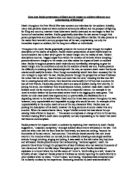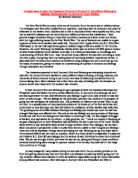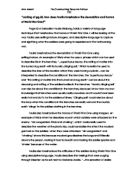Faulks presents the impact of death on soldiers by exploring their reactions to death. Faulks suggests an, ‘unspoken conspiracy,’ amongst soldiers about events witnessed in the war. This occurred when men left the front lines for their break, and acted as nothing, ‘beyond the boundaries of human nature,’ had occurred. This attitude shows secretly that men knew events in the trenches where not normal, but by outwardly showing a seemingly carefree attitude through drinking, singing and joking, it was easier to live with what they had done and witnessed. Faulks presents some men as becoming, ‘hardened against,’ death. He presents this attitude through the perspective of Jack Firebrace who had watched thousands of men die around him in horrific ways. Examples are given when Faulks describes an explosion in a tunnel where the horrific scene of Turner’s, ‘skull rolling to a halt,’ shows the brutality of war. However Faulks presents Firebrace as merely reporting the deaths bluntly to other soldiers when he states, ‘Turner’s dead,’ and having, ‘expressionless exhausted eyes.’ He is clearly numbed by the experience. Becoming hardened to death was beneficial to soldiers as deaths were so numerous, it was not possible to mourn every soldier as this would have undoubtedly caused breakdowns among soldiers. Faulks shows through letters written to the home front the hidden fear men had of dying. Through the attempted optimistic phrases sent to loved ones such as, ‘Don’t worry about me, please,’ it is suggested men felt they needed to have subvert their fear of death so as not to worry those they cared about. Contrastingly, through the perspective of Stephen Wraysford, Faulks shows the need to express fear soldiers had about death. He shows this through his letter to Isabelle, where he bluntly states ‘I am frightened of dying.’ Faulks presents this open attitude as being unusual as many men felt pressured to hide their fear, either because of the silent conspiracy, or because they wanted to appear strong, patriotic men who could handle the prospect of their own death.
Since death in war was so numerous and horrific; the impact often led to psychological problems among soldiers. Some soldiers are presented as having accepted their fate, such as Jack Firebrace who realistically believed, ‘he would fall like millions of the dead who had gone down.’ However, Faulks also expresses breakdowns in men either during or after the war. An example of breakdowns during war is that of the young, seemingly patriotic Tipper. Faulks describes him as in a, ‘spasmodic,’ fit where he let out, ‘primitive screams.’ This suggests the maddening effects of trench warfare in particular the brutal reality of witnessing horrific events. Also breakdowns are shown during the big push by the padre Horrocks. Faulks presents the powerful image of a priest losing his faith in God by, ‘pulling the silver cross from his neck and hurling it in front of him,’ after witnessing the slaughter of thousands of men. This shows how powerful the impact of death had psychologically as if it could destroy even the devout faith of a priest, other men were left with little hope. Faulks also explores the delayed impact of war and the effects of shell shock. Images that were, ‘burned,’ into soldiers minds generally never left; even when they were safe behind the lines. When Stephen returns to England on leave, Faulks describes him as, ‘shaking,’ and, ‘frightened [expecting] some spasm or bleeding or death,’ as this is what he is so used to in the trenches. Many soldiers would have been haunted by these images for the rest of their lives, therefore causing the impact of death psychologically as being one of torture, as soldiers had to find ways to live with what they had done. The reader learns through the investigations of Stephen’s granddaughter, Elizabeth, that he remained mute two years after the fighting ended in his need to understand his wartime experiences.
The impact of death on men left them fearful for their own lives, therefore Faulks describes ways in which men attempted to cope with this fear. Faulks presents drinking alcohol as a way in which men coped with war and death. Frequent examples are presented by Faulks, such as when Weir is described as being in a, ‘drunken way,’ or after the death of Arthur Shaw where men are described to have, ‘drank and drank.’ Drinking is used as a way of coping as it is able to remove, ‘painful memories kept in place by sobriety,’ therefore allowing the soldiers to forget their problems, and giving them a brief escape from war. Faulks also presents card games and rituals as a way of coping. When Stephen attempts to tell Weir’s fortune to predict his future for the war. Stephen later admits to, ‘fixing,’ the results he describes to Weir as, ‘the best horoscope you could have.’ This helps the fragile character Weir, gain some hope from the strains of warfare. Also, in Stephen, ‘fixing,’ the cards, Faulks presents comradeship through men working together to make trench life easier. Faulks also shows comradeship through the perspective of Stephen Wraysford, where he comforts the dying Douglas after a shellfire attack. Stephen attempts to help Douglas cope through trying to assure him that he will not die and reminds him of his wife to show Douglas what he had to live for. Through events such as this, compassion is shown by the soldiers; showing comradeship, as men did not want their fellow men to die in such horrific ways uncared for and wanted to help in any way to make the inevitable easier.
Throughout the novel , Faulks presents death in a horrific manner. He graphically describes death in warfare and emphasises mass dehumanization and pain caused by mechanisation. Faulks presents the impact that relentless death had as a cause for some men to become hardened against death, for others to break down and suffer psychological problems and also prompted others to try to find ways to cope with warfare. Faulks successfully causes an impact on the reader through his blunt and detailed descriptions of trench warfare. Not only is further insight given into how life would have been for soldiers, but also Faulks gives them identities making it easier for the reader to relate to them. This ultimately makes it even more disturbing to realise the horrific deaths faced by men and also, the long term effects they may have suffered, long after the fighting stopped.







